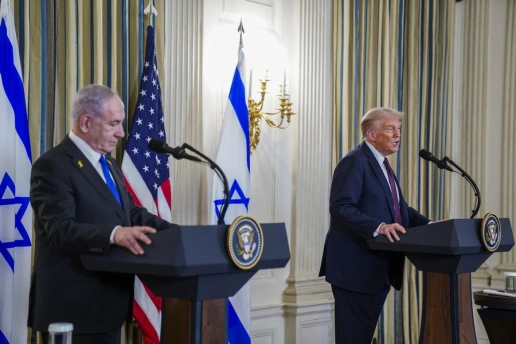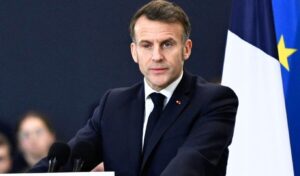Political analysts see a restart of peace processes to bring the Middle East onto a path of stability after months of terrible escalation, following the critical private meeting between Donald Trump and Benjamin Netanyahu in the Oval Office. The 20-point plan that the American president has proposed to begin implementing the Gaza ceasefire and subsequently discussions for reconstruction appears to have found a positive response from Israel, which shows that this agreement satisfies its demands. However, the thorn remains Hamas’s stance, which insists on refusal. As international media write, following the dynamics of this triangle, it is likely that the US and Israel will create a regime of suffocating pressure aimed at forcing Hamas to back down. The major challenge is to achieve the withdrawal of the terrorist organization’s units from Gaza, for which a demilitarization plan is being attempted as well as the creation of zones in which Israel will have a say regarding security.
Trump-Netanyahu meeting: Victory messages
“This is a historic day of peace” was, among other things, Trump’s message with the proceedings in the White House where he presented the 20-point plan for ending the war in Gaza. Countries such as Saudi Arabia, Qatar, the United Arab Emirates had a say in drafting the plan, while perhaps the most important point – which has long been a source of escalating climate of reactions against Netanyahu from sections of the public – is the return of all hostages, a prerequisite for the war to end.
According to Trump, the complete disarmament of Hamas, the demilitarization of Gaza and ensuring that Israel will maintain its own zone have been agreed upon. “The Hamas threat has been destroyed,” the American president conveyed, adding that Arab and Muslim countries will also deal with Hamas. He announced that a special peace council has been formed to oversee the ceasefire plan and which he wants former British Prime Minister Tony Blair to join.
Hamas, however, has not accepted the proposal which Trump characterizes as “extremely fair,” adding that the Palestinian people have suffered for years under Hamas.
Netanyahu, for his part, conveyed that his country’s demands are being satisfied and that he did not participate in this “tragic” war for Hamas to remain in Gaza.
The “apology” to Qatar
It is noted that hostage families thanked Trump in their letter after the ceasefire agreement announcement. It remains to be seen how the Republican president’s plan will be handled by partners in the hardline wing of Netanyahu’s government who criticized him for the “apology” to Qatar’s prime minister for the attacks, a step taken on Trump’s initiative.
Among the key points of Trump’s proposal, however, is the release of all remaining hostages, a permanent ceasefire, Israel’s gradual withdrawal from the entire Gaza Strip, a post-war plan with a governance mechanism in Gaza without Hamas, a security force that will include Palestinians as well as soldiers from Arab and Muslim countries, funding from Arab and Muslim countries for the new Gaza administration and reconstruction of the enclave, as well as some involvement of the Palestinian Authority.
The new plan allows Hamas members to receive amnesty and leave Gaza for third countries after the hostage release.
However, it is still not clear exactly how Hamas will not exist in the future and will not continue to threaten Israeli citizens.
The 20 points of Trump’s plan
- Gaza will be a deradicalized zone free of terrorism that poses no threat to its neighbors.
- Gaza will be redeveloped for the benefit of the people of Gaza, who have already suffered more than enough.
- If both sides agree to this proposal, the war will end immediately. Israeli forces will withdraw to the agreed line to prepare for hostage release. During this period, all military operations, including air strikes and artillery bombardments, will be suspended, and battle lines will remain frozen until terms for full gradual withdrawal are met.
- Within 72 hours of public acceptance of this agreement by Israel, all hostages, living and dead, will be returned.
- Once all hostages are released, Israel will release 250 life-sentenced prisoners as well as 1,700 Palestinians from Gaza who were arrested after October 7, 2023, including all women and children held in this context. For each Israeli hostage whose remains are returned, Israel will hand over the remains of 15 dead Palestinians from Gaza.
- Once all hostages are returned, Hamas members who commit to peaceful coexistence and will lay down their weapons will receive amnesty. Hamas members who wish to leave Gaza will be provided safe passage to countries that will receive them.
- Upon acceptance of this agreement, full humanitarian aid will be immediately sent to the Gaza Strip. As a minimum level, aid will correspond to quantities that were included in the January 19, 2025 humanitarian aid agreement, including infrastructure restoration (water, electricity, sewage), hospital and bakery restoration, and entry of necessary equipment for debris removal and road opening.
- The entry and distribution of aid to the Gaza Strip will be carried out without interference from either side, through the United Nations and their services, the Red Crescent, as well as other international institutions not related to any party. The opening of the Rafah crossing in both directions will be subject to the same mechanism applied in the January 19, 2025 agreement.
- Gaza will be governed by a temporary transitional governance of a technocratic, apolitical Palestinian committee, responsible for daily provision of public services and municipal operations for the benefit of Gaza’s people. This committee will consist of specialized Palestinians and international experts, overseen by a new international transitional organization, the “Peace Council,” chaired by President Donald J. Trump. Participating members and heads of state will be announced, including former Prime Minister Tony Blair. This body will set the framework and manage funding for Gaza’s reconstruction until the Palestinian Authority completes its reform program, as presented in various proposals (e.g. Trump’s 2020 peace plan and the Saudi-French proposal), and can safely and effectively resume control of Gaza. The body will implement the best international standards for modern and effective governance that will serve Gaza’s people and attract investment.
- A Trump economic development plan for Gaza’s reconstruction and revitalization will be created through a committee of experts who contributed to creating modern, successful miracle cities in the Middle East. Many targeted investment proposals and development ideas that have been shaped by international teams will be considered, so as to be integrated with security and governance frameworks to attract and facilitate investments that will create jobs, opportunities and hope for Gaza’s future.
- A special economic zone will be created with preferential tariffs and access terms to be negotiated with participating countries.
- No one will be forced to leave Gaza, and those who wish to leave will be free to do so and return. We will encourage people to stay and offer them the opportunity to build a better Gaza.
- Hamas and other factions will agree to have no role in Gaza’s governance, directly, indirectly or in any form. All military, terrorist and offensive infrastructure, including tunnels and weapons manufacturing facilities, will be destroyed and not rebuilt. There will be a Gaza demilitarization process under independent observer oversight, which will include permanent withdrawal of weapons from use, through an agreed disarmament process, supported by an internationally funded buyback and reintegration program, all verified by independent observers. The New Gaza will be fully committed to building a prosperous economy and peaceful coexistence with its neighbors.
- A guarantee will be given by regional partners to ensure that Hamas and factions will honor their obligations and that the New Gaza will not pose a threat to neighbors or their people.
- The United States will work with Arab and international partners to develop a temporary International Stabilization Force (ISF), which will be deployed immediately in Gaza. The ISF will train and support accredited Palestinian police forces in Gaza, in cooperation with Jordan and Egypt, which have significant experience in this field. This force will constitute the long-term solution for internal security. The ISF will cooperate with Israel and Egypt for border security, together with the new Palestinian police forces. It is critical to prevent weapons imports into Gaza and facilitate rapid and safe flow of goods for reconstruction and revitalization of the area. A conflict avoidance mechanism between the parties will be agreed.
- Israel will not occupy or annex Gaza. As the ISF establishes control and stability, the Israeli Defense Forces (IDF) will withdraw based on standards, milestones and timetables to be agreed between IDF, ISF, guarantors and the United States, aiming for a secure Gaza that no longer threatens Israel, Egypt or their citizens. In practice, the IDF will gradually hand over Gaza areas they occupy to the ISF, according to an agreement to be reached with the transitional authority, until their complete withdrawal, except for a security zone that will remain until Gaza is fully secure from any reappearance of terrorist threat.
- In case Hamas delays or rejects this proposal, the above, including the enhanced humanitarian operation, will continue to be implemented in terrorism-free areas that will be handed over by the IDF to the ISF.
- An interfaith dialogue process will be created, based on values of tolerance and peaceful coexistence, to change the mentalities and narratives of Palestinians and Israelis, emphasizing the benefits that can arise from peace.
- As Gaza’s reconstruction progresses and the Palestinian Authority’s reform program is consistently implemented, conditions may eventually be created for a credible path toward Palestinian self-determination and statehood, which we recognize as an expectation of the Palestinian people.
- The United States will initiate dialogue between Israel and Palestinians to agree on a political horizon of peaceful and prosperous coexistence.




